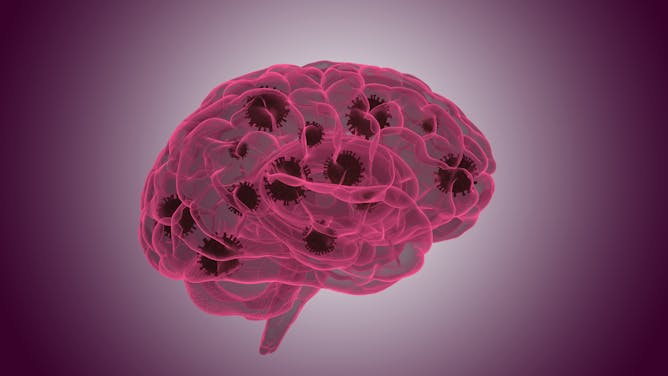|
A significant number of people with long COVID contend with “brain fog”, cognitive symptoms such as difficulties with concentration and memory. There’s also growing concern about evidence that people who have had COVID are at increased risk of developing brain disorders, such as dementia.
It’s difficult to study how exactly a COVID infection affects the brain, because we can’t experiment on living people. To get around this, scientists from the Karolinska Institute created miniature brains from stem cells. After infecting these models with the coronavirus, they found an excessive elimination of synapses, the connections between brain cells. Two of the study’s lead authors tell us how this might explain the cognitive symptoms sometimes seen in long COVID.
Meanwhile, another new piece of pandemic-related research has explored the benefits COVID vaccines have had on our mental health. The effects of getting a jab were particularly positive for older and clinically vulnerable groups, significantly alleviating COVID-related psychological distress.
If you’re feeling stressed, you might look to exercise, activities you enjoy, or even mindfulness. One stress-buster probably not at the top of your list is fermented foods, but a new study suggests that including fermented foods and fibre in your diet can lower stress levels. When I’m feeling stressed, I often turn to a book. I have to say black vampire literature isn’t a genre I’ve come across before – but it does sound fascinating. With Halloween approaching and as the nights grow longer, here are three essential tales of black vampirism to enjoy.
|

|
Phoebe Roth
Commissioning Editor, Health + Medicine
|
|

Foods such as kimchi are great to include in a psychobiotic diet.
Nungning20/ Shutterstock
John Cryan, University College Cork
Our latest study adds further evidence that diet and mental health are closely connected.
|

COVID can cause long-lasting cognitive symptoms. But why?
Alexander Limbach/Shutterstock
Samudyata, Karolinska Institutet; Carl Sellgren, Karolinska Institutet
Many people face persistent cognitive symptoms after COVID-19. A new study, which grew and examined 3D models of the human brain, offers a possible explanation as to why this might be.
|

Alfonso Bresciani/AMC
Joan Passey, University of Bristol
Black vampires have existed for 200 years in literature.
|
Ukraine Invasion
|
-
Nicholas James, University of Oxford
Russians find it hard to envisage a Russia after Putin.
-
Jonathan Este, The Conversation
Some of the key articles from our coverage of the war in Ukraine over the past week.
|
|
Politics + Society
|
-
Robert Lawson, Birmingham City University
Andrew Tate’s content offers a toxic blend of self-improvement and male supremacism.
-
Edmund Stewart, University of Nottingham
The first people who studied tyranny were the ancient Greeks, an expert says.
-
Liam Martin Bird, Aberystwyth University
You be the judge: just how wacky can jury decisions be?
-
Jonathan Lewis, Bangor University
France’s ‘renewed partnership’ with Algeria may be less about exploring a difficult and painful past and more about pressing political concerns.
|
|
Arts + Culture
|
-
Ken Drinkwater, Manchester Metropolitan University; Neil Dagnall, Manchester Metropolitan University
No, Avril Lavigne isn’t dead – the science behind conspiracy theories.
|
|
Education
|
-
Sarah Pitt, University of Brighton; Alan Gunn, Liverpool John Moores University
Snails use their slime to help them move, stop them drying out and to scare off predators.
|
|
Health
|
-
Kausik Chaudhuri, University of Leeds; Peter Howley, University of Leeds
The mental wellbeing benefits associated with COVID vaccination were substantial among older and clinically vulnerable people, but negligible for younger adults.
-
Richard Tunney, Aston University
Deprivation in childhood is a strong predictor of obesity, gambling, smoking and addiction in adulthood.
|
|
Science + Technology
|
-
John Kusel, University of Glasgow
Cell membranes are a basic structure common to most living organisms – but they can be hijacked.
|
|
|
|
| |
|
|
|
|
| |
| |
| |
| |
| |
|
|